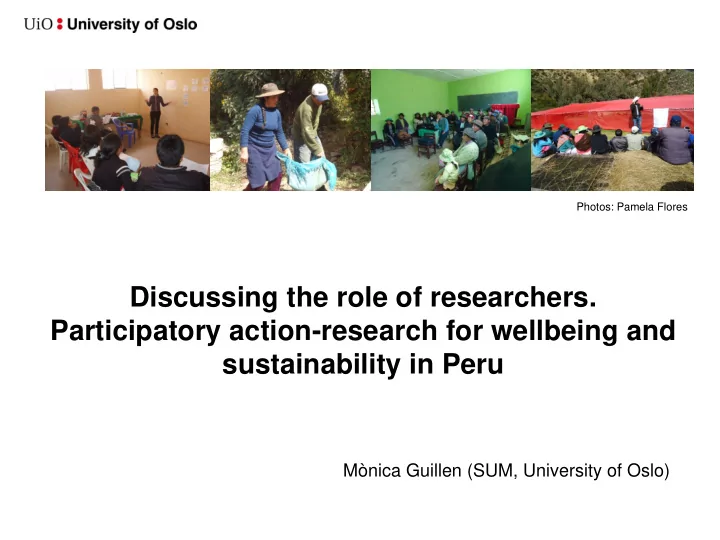

Photos: Pamela Flores Discussing the role of researchers. Participatory action-research for wellbeing and sustainability in Peru Mònica Guillen (SUM, University of Oslo)
Goal The context: Research suggests that ecological sustainability and human wellbeing are compatible. The difficulty: Finding strategies to promote both wellbeing and ecological sustainability. The current project: Using a participatory methodology researchers and participants from an Andean village engage in a process of change through strategies designed, developed and implemented by them. 2
Overview • Background of the project • The HSD framework • PAR and the researcher’s position • PAR in Acostambo – The problem of asistencialismo – Organic vegetable gardens • Reflecting on the role of researchers 3
Background of the project (I): Peru • South-American middle-income country experiencing a decade of rapid growth • A highly unequal society with 32% people living under the national poverty line • A low ecological footprint that has doubled in the last 6 years • An economic growth based on mining and hydrocarbon exploitation contributing to biodiversity loss and pollution of rivers and lakes. 4
Background of the project (II): research on wellbeing and the environment • The economics of happiness : Richard Easterlin and the Happy planet index (‘Happy lives do not have to cost the earth’] • Positive psychology : research on values and goals • Human Scale Development : Manfred Max-Neef • Post-doctoral project on sustainable development and wellbeing in Peru. A mixed-methods approach. Preliminary conclusions after quantitative analysis: – Richer people have higher SWB but do not have more pro- environmental attitudes – People with a intrinsic goal orientation [concern for the community, self-acceptance, close relationships] have both higher SWB and pro-environmental attitudes 5
Max- Neef’s Human Scale Development (HSD) Participatory workshops articulated • Results in Acostambo: around a matrix of needs and existential categories BEING HAVING DOING INTERAC- TING SUBSISTENCE PROTECTION AFFECTION UNDERSTAN DING PARTICIPA- Utopian satisfiers were also described TION in terms of cooperation, reciprocity, IDLENESS respect, understanding, care for water CREATION springs and soil, patience and IDENTITY openness, etc. which are attributes FREEDOM linked to intrinsic values 6
PAR and the researcher’s position • PAR: ‘Inquiry done by or with insiders to an organisation or community, but never to or on them’ (Herr and Anderson 2005:3) • Outsider(s) in collaboration with insiders 7
PAR in Acostambo From April 2012 to January 2013 • Periodical participatory workshops [12] and in-depth interviews [19] • Characteristics: – Open – Flexible – Not assuming participants as oppressed – Join design, planning and implementation of strategies – Encouraging critical reflection 8 Photos: Pamela Flores
PAR in Acostambo: The problem of asistencialismo • Organic farming known in Acostambo through NGO’s and a former health worker • Asistencialismo or dependence as a hurdle Photo: La Republica ‘We cannot say that Huancavelica is a poor departamento (regional unit), we have everything, but unfortunately we have been spoiled by the government that every year comes to give us presents and we have got used to that. We are not used to produce quality, to improve our economic situation. People only expect presents and in my opinion this is very bad.’ (male participant, 39) 9
Organic vegetable gardens (I) • Strategy prioritised by participants as contributing to advance towards satisfaction of human needs (union, knowledge, higher economic level) • Training by local vocational school teacher • Seeds donated by Mayor • Work in the seedbeds and own private gardens organised by participants • Only lettuces and onions grew in the seedbeds, carrot beetroot and radish planted directly in private gardens • Distribution depending on the amount of land prepared by the households 10 Photos: Pamela Flores
Organic vegetable gardens (II): contributing to wellbeing and sustainability Community union • Participants and supporters from different institutions and neighborhoods • Organic farming as collaborative work Knowledge • Limited learning from training session particularly women • Learning from working together on seedbeds under supervision of their own team leaders Economic level • Savings through own production and better health • Additional income through sales of surplus Ecological sustainability • Reduce intensity of use of chemical fertilizers • Aligns with their concern for water streams and springs 11
Final considerations: the role of the researcher • PAR encourages the researcher to become modest, less prescriptive and in constant learning process. • Researcher closer to participant, personality becomes relevant. • Asistencialismo as a barrier, PAR researcher risks reproducing expert-participant division. 12
Acostambo Altitude : 3,600 m. Population: 4,537 spread in 18 annexes, 2 populated centres and 7 neighbourhoods Economy: smallholders depending on farming of barley, potatoes, wheat, peas, beans and maize Poverty (Huancavelica): 70% Illiteracy: 17% (27% women) Quechua: 41% Material of floor: 94% earth NGO’s : Caritas, Adecap Social programmes: Glass of milk, Pension 65, Juntos, Pronamaa, Wawa Wasi, Agrorural. 13
Recommend
More recommend